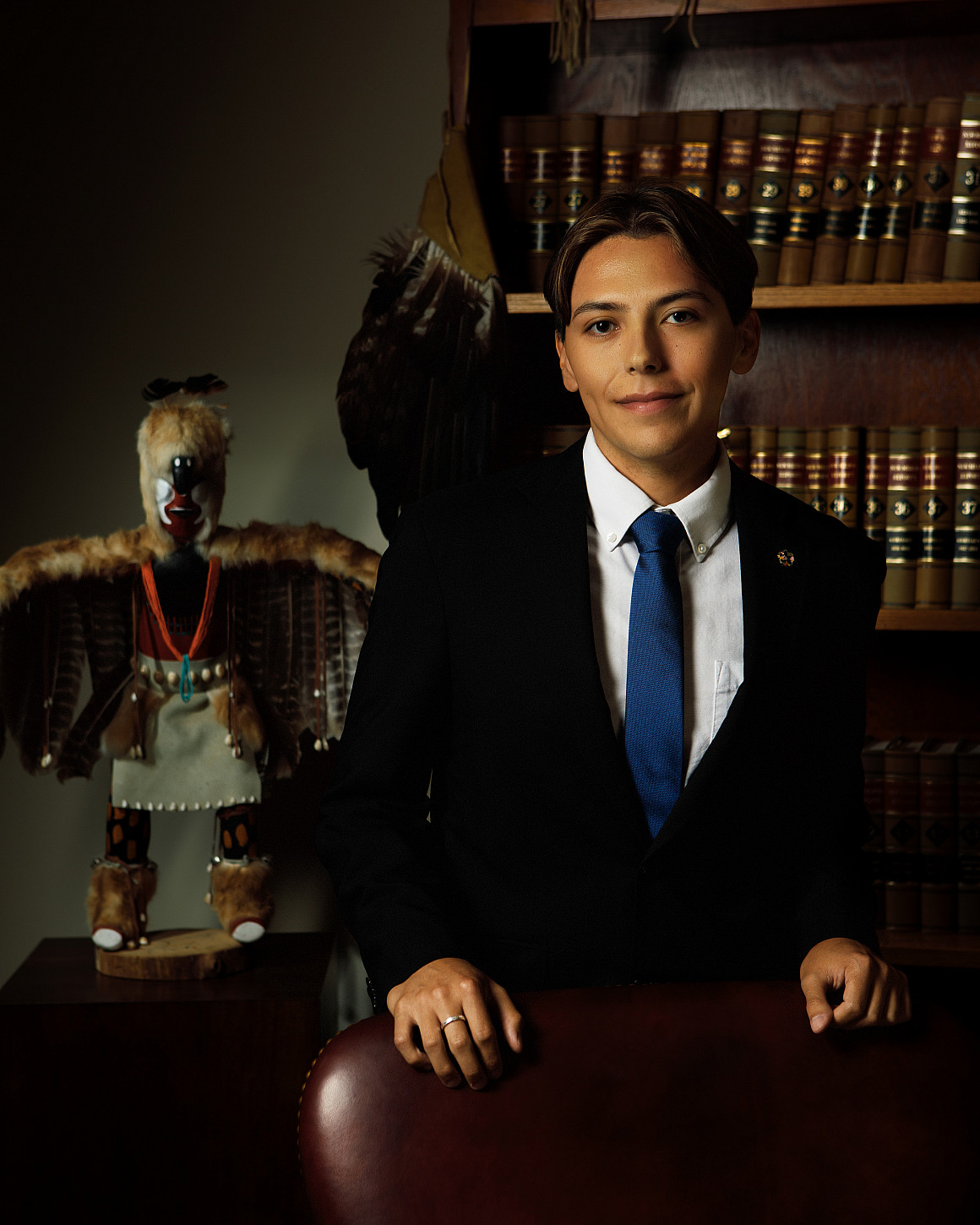main content Scholarship Inspires Student to “Fan the Flames of Tribal Sovereignty”
Vincent Montanic Sheoships is this year’s Nelson D. Terry Scholarship recipient. “I am close to achieving my dream of becoming a practicing attorney, and I look forward to fanning the flames of Tribal sovereignty through upholding federal laws that make Tribes distinct and unique.”

Lewis & Clark Law student Vincent Montanic Sheoships ’27 received the Nelson D. Terry Scholarship in 2024.The Scholarship, funded by the Quinault Indian Allottees Association, supports law students who are either Quinault Allottees, or are regional and national applicants with a connection to the Quinault culture and heritage. The scholarship stems from the historic Supreme Court Case of United States v. Mitchell (1983), where a judgment of $26 million established that the United States must pay monetary damages when it breaches its trust to Indians. Nelson D. Terry was a forester for the Quinault Allottees Association and was key in finding facts necessary for winning the Supreme Court case.
“I am beyond grateful for receiving the Quinault Indian Allottees Association Nelson D. Terry Scholarship,” noted Vincent on receiving the scholarship. “The scholarship not only represents the need to hold the federal government accountable for its fiduciary duties but also the continued need to advocate for Indian Country. I am humbled to receive this scholarship. It will facilitate my dream to become an Attorney and advocate not only for my Tribal community but for Indian Country as a whole,” he added.
Vincent grew up on the Confederated Tribes of the Umatilla Indian Reservation (CTUIR). He is an enrolled member of the CTUIR and a descendant of the White Mountain Apache Tribe in Arizona. Vincent obtained his Bachelor of Arts from Oregon State University, where he majored in Political Science and minored in Natural Resources. He worked for the CTUIR’s Tamástslikt Cultural Institute, as well as CTUIR’s in-house legal counsel and healthcare clinic.
Vincent was raised with the traditional and Indigenous values and laws known as Tamánwit, which guides his way of thinking. Tamánwit recognizes the interconnectedness between the individual, community, and surrounding environment and emphasizes the importance of maintaining a balance between the three via public service. “ Tamánwit has instilled in me the value of giving back to my Tribal community in a bigger and better way,” said Vincent. “ Tamánwit has been my guiding light and has not only made me want to pursue a career where I can give back to my community but also be capable of making change.” Vincent recognized that the best way for him to give back and make a difference is through pursuing a career in the legal field. He grew up and saw how federal laws have a daily impact on Tribal activities and how it is a cornerstone of modern-day Tribal sovereignty. “I am close to achieving my dream of becoming a practicing attorney, and I look forward to fanning the flames of Tribal sovereignty through upholding federal laws that make Tribes distinct and unique.”
Vincent chose Lewis & Clark Law School because of its position on the leading edge of Environmental and Natural Resource Law and the school’s recognition of the importance of utilizing the law to protect and enhance the environment and properly manage natural resources. “These topics are important not only to myself but also to the core values that I grew up with, known as Tamánwit.” Vincent strives to obtain a foundation of necessary legal knowledge to protect and enhance Tribal sovereignty when it comes to Tribal Environmental and Natural Resources rights.
Law Communications is located in room 304 of Legal Research Center (LRC) on the law Campus.
MSC: 51
email jasbury@lclark.edu
voice 503-768-6605
Cell: 626-676-7923
Assistant Dean,
Communications and External Relations, Law School
Judy Asbury
Law Communications
Lewis & Clark Law School
10101 S. Terwilliger Boulevard MSC 51
Portland OR 97219
More Stories

International Visitor Lecture: How Environmental Agreements Helped Avoid the Tipping Point in Earth’s Temperature
Durwood Zaelke, professor and advocate against super pollutants, shared his insights on global environmental agreements that protect the climate and avoid triggering a tipping point in the Earth’s temperature.

Earthrise Caps Off Another Successful School Year
Earthrise wrapped up a successful 2024–25 school year, with students contributing to major environmental victories, including protecting endangered species and restoring river habitats. The clinic also welcomed back co-founder Dan Rohlf as director as it looks ahead to its 30th anniversary.

Claire Tonry ’09 Honored with Kerry Rydberg-Jack Tuholske Award for Public Interest Litigation
Claire Tonry ’09 is carrying on a powerful legacy of environmental justice. Her work was recognized with a prestigious award at the Public Interest Environmental Law Conference.

Practice With Purpose: Inside Lewis & Clark’s Lawyering Program
Lewis & Clark Law School’s Lawyering Program equips students with the essential skills required for effective legal analysis, writing, and advocacy. Emphasizing a student-centered approach, the program also gives students practical training through innovative course design.